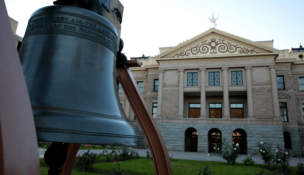Maricopa County Republican say transportation ballot measure fell short of vote threshold to pass
Kiera Riley Arizona Capitol Times//December 4, 2024//
Maricopa County Republican say transportation ballot measure fell short of vote threshold to pass
Kiera Riley Arizona Capitol Times//December 4, 2024//
Maricopa County Republicans are asking a judge to kill the county’s latest version of a long-running transportation sales tax, given a failure to reach 60% voter approval.
Initially adopted in 1985 as Prop. 300, continued in 2004 as Prop. 400 and passed in 2024 as Prop. 479, the county’s half-cent transportation sales tax has continued to fund freeway, public transit and arterial street projects for nearly four decades.
An election contest filed Nov. 30 by the Maricopa County Republican Committee claims the latest extension on transportation infrastructure funding cannot stand under a 2022 measure requiring 60% voter approval on tax related referendums.
According to official election results, the measure fell short of 60%, with 59.83% voter approval.
The suit was initially met with scrutiny from Prop. 479 supporters, given Prop. 479 did not change the sales tax itself, but rather how the funds are distributed. But some say the lawsuit still has a fighting chance as the proposition missed, albeit by 0.17%, the threshold set out in a 2022 constitutional amendment.
In the complaint filed Nov. 30, the MCRC, represented by attorney Bryan Blehm, claimed Prop. 479 must fail given a 2022 legislature referral, Proposition 132, which requires “any measure under which the referendum is applied, shall be referred to a vote of the qualified electors, and for the initiative and referendum to approve a tax, shall become law when approved by sixty percent of the votes cast thereon.”
Blehm asked for the court to decertify the measure and wrote, “Proposition 479 did not receive 60% of the vote and the Arizona Constitution provides no provisions for rounding up to achieve the 60% requirement.”
The lawsuit to walkback Prop. 479 named Secretary of State Adrian Fontes, the Maricopa County Board of Supervisors and the Maricopa County Treasurers Office.
Connect Maricopa, the committee that worked to pass Prop. 479, filed a motion to intervene Wednesday. David Martin, president of the Arizona Chapter of the Associated General Contractors Association, said the association was considering intervening in the suit, too.
“It’s the will of the voters. They want to preempt the will of the voters,” Martin said. “A small, small group of partisans, a micro minority of partisans, want to upend the will of the voters.”
But others rose to the lawsuit’s defense, claiming the proposition missed the clear cut threshold set out in the new law.
Rep. Alexander Kolodin said “I don’t understand why it’s frivolous. A referendum to approve a tax has to get 60% of the votes to pass and it didn’t get 60% of the votes, therefore it didn’t pass.”
Prop. 479 is not a new tax.
Prop. 300, passed by voters in 1985, established the 20-year half-cent sales tax to finance freeways. In 2004, the legislature renewed it as Prop. 400, with 56.2% going to freeway and highway, 10.5% to arterial street projects and 33.3% to public transit.
With a 2026 deadline, the legislature first started to tool with a Prop. 400 extension in 2022 and sent a version that would allocate 37.4% to freeways and highways, 22.2% to arterial street programs and 40.4% to public transit.
Gov. Doug Ducey vetoed the bill, writing in his veto letter his concerns with high inflation, “biased” language in the ballot measure description and “troubling” election date.
Prop. 400 returned in the 2023 session and was greenlit by Gov. Katie Hobbs after lengthy negotiation with Republican leadership.
Senate President Warren Petersen, R-Gilbert, dubbed it the “most conservative Prop. 400 plan in Arizona history,” noting a block on funds for expansion of light rail, commuter rails, trolleys and street cars, and it put a kibosh on the proposed expanded Capitol loop and an increase in the cut going to road and freeway projects.
As passed by voters in 2024, Prop. 479 would keep the same half-cent sales tax but dedicate 40.5% to freeways and highways, 22.5% to arterial roads and 37% to transit.
According to the Maricopa Association of Governments, the plan is projected to generate $14.9 billion in revenues.
Martin, noted, though, the consequences if the claim is successful.
“We’d probably come to gridlock.Think about that. The system is incredibly important to the economy, and this specific extension is integral to connecting people and goods and services, period,” Martin said. “If a small group of people want to upend that, shame on them.”










































